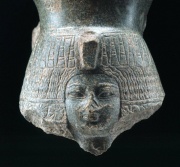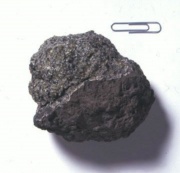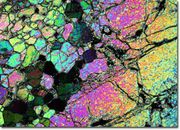Peridotite
Description
A family of coarse-grain igneous rocks composed of varying proportions of Olivine and Pyroxene with a granite-like texture. Most peridotite rocks are a dull green to black in color. The yellow to light green dunite, is a special type of peridotite that contains a high percentage of olivine. Dunite is named for Dun Mountain in New Zealand. Significant deposits of peridotite are found in South Africa, Australia, Tanzania, and the U.S. (Arkansas, Georgia, Kentucky, California, Arizona, New York, New Mexico, North Carolina, Washington). Peridotite is a host rock for chromium ores, naturally occurring diamonds, Chrysotile Asbestos, Talc, and native Platinum.
Synonyms and Related Terms
dunite; kimberlite; peridolita (Esp.); peridotiet (Ned.); perydotyt (Pol.); peridolito (Port.); Peridotit (Deut.)
Physical and Chemical Properties
- Mohs Hardness = 5.5 - 6.0
Resources and Citations
- R.F.Symmes, T.T.Harding, Paul Taylor, Rocks, Fossils and Gems, DK Publishing, Inc., New York City, 1997
- Encyclopedia Britannica, http://www.britannica.com Comment: "peridotite" [Accessed January 22, 2002].
- C.W.Chesterman, K.E.Lowe, Audubon Society Field Guide to North American Rocks and Minerals, Alfred A. Knopf, New York, 1979
- Wikipedia: http://en.wikipedia.org/wiki/Peridotite (Accessed Nov. 9, 2005)
- Random House, Webster's Encyclopedic Unabridged Dictionary of the English Language, Grammercy Book, New York, 1997
- The American Heritage Dictionary or Encarta, via Microsoft Bookshelf 98, Microsoft Corp., 1998


